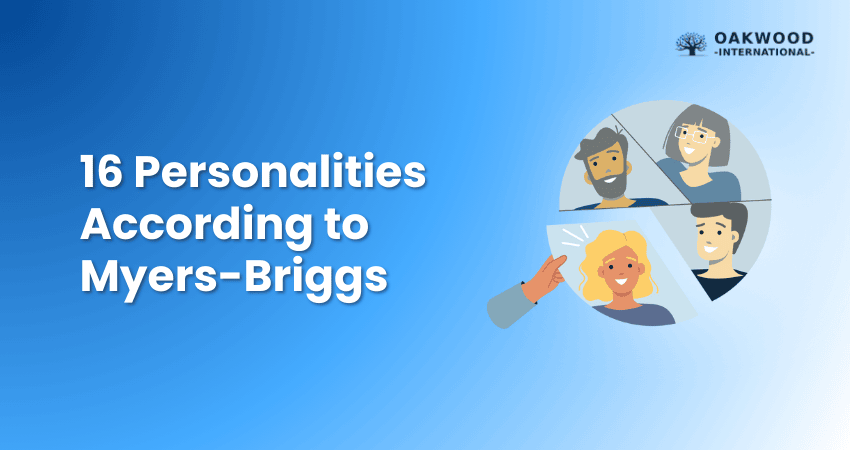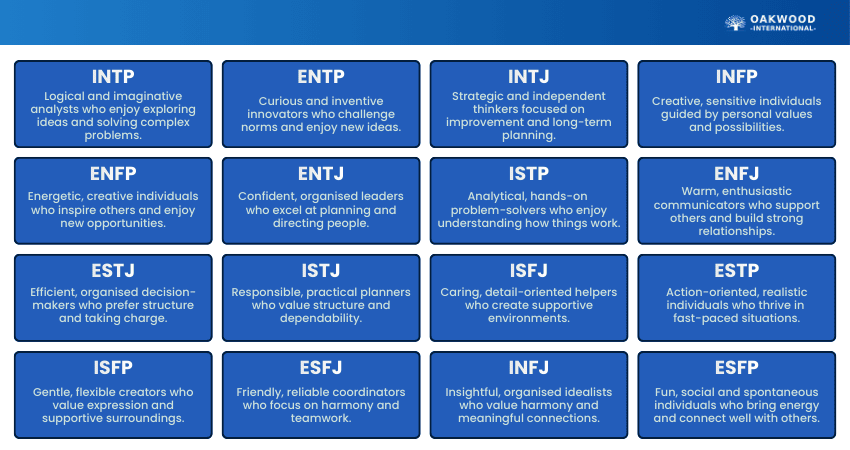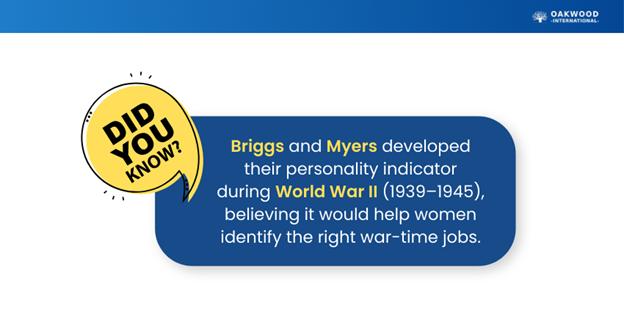Table of Contents


Some people thrive in the spotlight while others prefer the quiet reflection of solitude. Some people are energised amidst chaos, while others crumble. If you are wondering the reason behind these different traits, the Myers-Briggs framework holds the answer. It offers fascinating insight through its 16 Personalities, each shaped by unique characteristics and preferences.
This blog explores these 16 Personalities that shape every kind of individual, from bold leaders and thoughtful visionaries to tradition-oriented people to the born showman. So read on, see which personality mirrors your inner world and appreciate the diversity in those around you!
What is Personality?
Personality refers to an individual's consistent patterns of feeling, thinking and behaving that make them different from others. It's the unique set of traits, attitudes, and opinions that remain relatively stable over time and influence how a person interacts with the world and others.
Personality is shaped by a complex combination of biological and environmental factors throughout a person's life. One of the best ways to understand it is through the 16 Personalities concept developed by Katharine Briggs and Isabel Myers.
What are the 16 Types of Personality?
The Myers-Briggs framework or the 16 Personalities framework can help anyone identify the type that best represents them. Each personality is built on four traits picked from eight possible options, which are grouped into pairs of opposites:
1) Introversion (I) vs Extroversion (E): Extroverts focus outward on interaction and exploration, while introverts prefer reflection and inward thought.
2) Intuition (N) vs Sensing (S): Intuitive types rely on instincts and future possibilities, whereas sensing types use facts and past experiences.
3) Feeling (F) vs Thinking (T): Feeling types make decisions based on emotions and empathy, while thinking types prioritise logic and analysis.
4) Perceiving (P) vs Judging (J): Perceiving types are spontaneous and flexible, while judging types prefer structure, order, and planning.
Now let’s explore the 16 Personalities in greater detail:

1) INTP
The INTP personality is very reflective, with a strong passion for design and innovation. Individuals with this type often enjoy logical analysis and seeking a deeper understanding of the world around them. They are naturally philosophical and they thrive on research and extended learning. Comfortable with complex subjects, they constantly look for underlying patterns and connections in everything they encounter.
2) ENTP
This personality has a lot of energy and is innovative. People with this personality thrive on interacting with the world to craft unique solutions. If this describes you, chances are that you enjoy intellectual challenges, exploring different perspectives and understanding people. Naturally curious, ENTPs love to indulge their curiosity whenever possible.
3) INTJ
Individuals with the INTJ personality type have a distinct perspective that often drives innovation. They are highly logical, drawing on objective observations and careful analysis to come to conclusions. They prefer solitude and thrive when reflecting deeply, which highlights their introverted nature. INTJs are known for strong organisational skills and they excel at structuring tasks and delivering work to exceptionally high standards.
4) INFP
People with an INFP type personality are creative idealists who live by their inner values and beliefs. For them, possibilities hold greater importance than current realities because they constantly envision a brighter future. They are deeply driven to seek truth and authenticity and they approach life with their own unique perspective.
Boost leadership impact through strategic talent development - join our Talent Management Training now!
5) ENFP
People with ENFP type personality are enthusiastic, people-oriented creators. They thrive on possibilities and fresh ideas. With their energy, warmth and passion, they bring excitement to new people and experiences. They take great joy in inspiring others and supporting them in bringing out their creative potential.
6) ENTJ
ENTJs are often seen as the extroverted counterpart of the INTJ. They are natural leaders. They are skilled at spotting inefficiencies in systems and processes and can be impressively decisive. Through their unwavering focus on setting goals and developing long-term strategies, they excel at solving organisational challenges. Their ideas are well-informed and they find purpose in sharing their knowledge to inspire others.
7) ISTP
People with the ISTP personality are highly adaptable and observant. They lean towards hands-on learning, which makes them resourceful in areas like mechanics or craftsmanship. They value clear, direct communication and rely on logical reasoning to make sense of the world. ISTPs are independent by nature and self-reliant. Most importantly, they excel at living fully in the present moment.
8) ENFJ
ENFJs are idealistic organisers. They are motivated by a strong vision of what benefits humanity. They have the ability to recognise potential in others and they often inspire growth and development. Their natural charisma and persuasive communication help them rally people around their ideas and bring positive change.
9) ESTJ
An ESTJ personality type involves a hardworking nature with a strong respect for tradition. ESTJs are highly organised and responsible and enjoy taking charge to improve both people and organisations. They are conscientious and prefer structured methods that are systematic and aligned with rules and norms.
10) ISTJ
Those who value structure and routine can be identified as an ISTJ personality type. ISTJs prefer their surroundings to have a sense of order. They always keep their personal space and appearance neat and presentable. They often rely on established procedures in daily life. By appreciating and upholding order, they can ensure consistency and a sense of reliability in all their actions.
Engage the right people for the right roles at the right time. Learn how to do it seamlessly in our Workforce Resource Planning Training - Register now!
11) ISFJ
ISFJs are dedicated caregivers who value loyalty to traditions and organisations. They are practical, compassionate and dependable. They are driven by a strong desire to support others and shield them from life’s challenges. They offer both care and protection in meaningful ways.

12) ESTP
ESTPs approach life with a sense of pragmatism. They often find abstract theories monotonous. They are energetic and spontaneous and learn most effectively through direct experience. They are highly observant and can quickly recognise when changes are needed. Their sociable nature differentiates them as natural leaders in group settings, even when they are not actively seeking leadership roles.
13) ISFP
People with the ISFP personality immerse themselves in their surroundings, though they may not always express this outwardly. Gentle and cheerful, they maintain a positive outlook. ISFPs are spontaneous and adaptable, preferring to embrace life as it unfolds rather than planning every detail.
14) ESFJ
ESFJs are caring and dependable individuals. They take their responsibilities seriously and are deeply sensitive to the needs of others. They are highly aware of the emotional atmosphere around them. They pay close attention not only to people’s feelings but also to how others perceive them.
15) INFJ
The INFJ personality is somewhat similar to the INTP. The key difference is that INFJs are more feeling-oriented and judging rather than perceiving. INFJs are highly creative and enjoy crafting unique solutions to challenges. They are deeply motivated to help others and are driven by a desire to see people reach their full potential. With a strong moral compass and imaginative skills, INFJs combine compassion with creativity for a meaningful impact.
16) ESFP
ESFPs are seen as the extroverted counterpart of the ISFP. They are lively and outgoing and often thrive as natural entertainers. They are warm, accepting and adept at connecting with others. With their optimistic outlook and adaptability, they easily adjust to new people and situations. ESFPs bring fun and energy to work while offering practical, common-sense solutions to problems.
How Accurate is the Myers-Briggs Test?
While the Myers-Briggs Type Indicator can be useful for building self-awareness, it’s generally not considered scientifically reliable. Several factors contribute to this:
1) Limited Scientific Backing: Despite its widespread use, there’s little empirical research supporting MBTI as a strong predictor of behaviour.
2) Inconsistent Results: Many people report receiving different personality types when retaking the test after only a short time.
3) Subjective Responses: The 16 Personalities model relies on individuals’ current perceptions of themselves, which can change over time.
4) Broad personality Descriptions: MBTI types are described in ways that can overlap. This makes it easy for people to relate to multiple types rather than fitting into one distinct category.
How to Take the Myers-Briggs Assessment?
You can complete the official Myers-Briggs personality assessment in three ways:
1) Online: The full assessment is available for purchase through MBTIonline.
2) With a Certified Practitioner: An MBTI Certified Practitioner can guide you through the test and explain the results.
3) Through Your Workplace or School: Many organisations and educational institutions offer the 16 Personalities assessment. You can check with your HR department or academic advisor.
Practical Applications of MBTI
Although the MBTI shouldn’t be viewed as absolute, understanding your personality preferences can offer valuable insights into career decisions and relationships.
1) Choosing Careers and Supporting Personal Growth
1) Choosing a Career Path
Each of the 16 Personality types has natural preferences that fit certain work environments. Intuitive (N) types excel in big-picture roles, while Sensing (S) types prefer detail-focused tasks. Thinking (T) types enjoy analytical work, whereas Feeling (F) types thrive in empathetic, people-centred roles.
2) Recognising Strengths and Weaknesses
Your MBTI profile can highlight your strengths and show how they translate into employable skills. For example, ENFJs often excel in communication and leadership. Understanding potential weaknesses helps guide personal development.
3) Aligning Values With Work
Some of the 16 Personalities types, particularly those with the NF combination, are highly values-driven. They often succeed in mission-oriented environments, nonprofits, or roles focused on meaningful impact and positive change.
2) Enhancing Communication and Relationships
1) Understanding Communication Styles
Preferences like Extraversion and Introversion reveal why some people seek social interaction while others need solitude. Acknowledging these differences helps minimise misunderstandings and strengthens relationships.
2) Supporting Empathy and Conflict Resolution
Knowing whether someone prefers Thinking (T) or Feeling (F) clarifies how they handle disagreements. Balancing logical reasoning with emotional sensitivity leads to healthier and more constructive resolutions.
3) Building Deeper Connections
Understanding how others process information (S/N) or make decisions (T/F) increases empathy and improves communication. This awareness helps relationships flourish through mutual respect and appreciation of diverse perspectives.
3) Understanding Team Dynamics and Collaboration
1) Assigning Tasks Effectively
Teams function best with a mix of personality types. Perceiving (P) types excel in adaptable, creative roles, while Judging (J) types provide structure by organising plans and timelines.
2) Balancing Team Energy
Introverts often need time to think before contributing, whereas Extraverts thrive through active discussion. Allowing space for both styles supports better teamwork and sustained productivity.
3) Reducing Miscommunication
Teams improve when different communication preferences are recognised. Encouraging Intuitives (N) to share big-picture ideas and Sensors (S) to contribute practical insights helps create well-rounded, effective decisions.
Tips to Get the Most Value From MBTI Results
Here are some proven tips to make the most of MBTI results:
1) Keep an Open Mind: Your MBTI type reflects general preferences, not fixed traits. Be willing to explore behaviours outside your usual patterns.
2) Look for Complementary People: Whether in study groups or work teams, connect with those whose strengths balance your development areas. Opposite types often provide valuable learning opportunities.
3) Use MBTI Thoughtfully: Avoid making major decisions based solely on your type. Treat MBTI as one part of a wider self-awareness process supported by feedback and real-world experience.
4) Review Your Type Periodically: Preferences can shift as you grow or adapt to new situations. Retaking the assessment later can reveal how your tendencies have changed.
MBTI Types Most Suited for Leadership Roles
There is no single ideal MBTI type for leadership. Every type can lead effectively by using its natural strengths. That said, individuals in traditional leadership positions often prefer Extraversion (E) and Judging (J). Leadership styles commonly fall into two broad groups:
1) The Executive Leaders (Thinker Types): These leaders excel at creating structure, setting strong goals and driving strategic plans. They are drawn to roles that require objective decision-making and long-term vision.
2) The People-centric Leaders (Diplomat Types): These leaders prioritise collaboration and shared values. Their strengths in empathy and communication make them well-suited to roles in educational or humanitarian environments.
Conclusion
The 16 Personalities framework provides a window into how people think, feel and thrive. By discovering your type, you can gain clarity on your strengths and growth areas, while also learning to value differences in others. Embracing such diversity is the key to deeper connections and understanding of the human experience.
Teams thrive when leaders rise. Learn how to be that leader with our People Management Courses - Register now!


 Back
Back



 Back to Catagories
Back to Catagories





 + 44 7452 122728
+ 44 7452 122728










